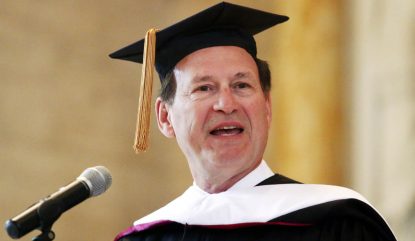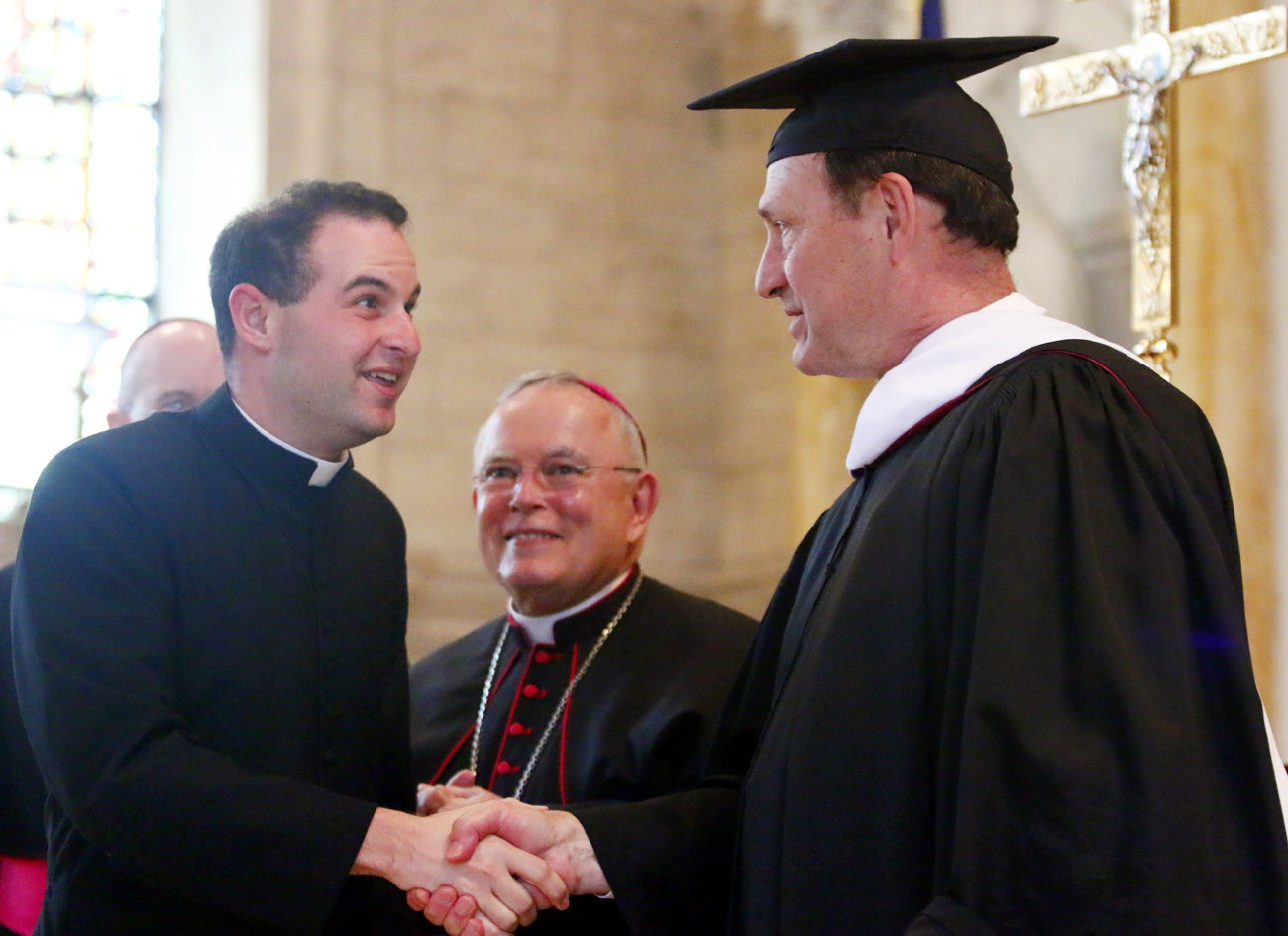
Rev. Mr. Eric Banecker
It might seem like a long journey from an an Italian household in Trenton, New Jersey to Associate Justice of the Supreme Court of the United States. But it is one which Samuel A. Alito, Jr. has taken, and with great success. There were many stops along the way, of course. Those stops were quite varied, from studying along the shores of the Tiber in Rome to childhood trips to Philadelphia for Phillies games.

United States Supreme Court Associate Justice Samuel A. Alito Jr. speaks at St. Charles Borromeo Seminary May 17. (Sarah Webb)
Seminarian Casual: Justice Alito, first of all, thank you for taking the time to answer a few questions for us and our readers. The Supreme Court has been on the minds of many people recently thanks to the year-long process of filling the seat of the late Justice Scalia. Can you share a favorite memory of Justice Scalia? What did you learn from him in terms of serving on the Supreme Court?
Justice Samuel A. Alito: I have so many fond memories it is hard to pick one. Whenever a justice has a birthday, we all sing happy birthday, and Nino always led the singing. Unlike the rest of us, he had a great voice. Since his death, on the occasion of every birthday, we have missed hearing his voice.
We also miss his voice at oral argument. He was a tough questioner, but he was very funny and always made the arguments fun.
[hotblock]
SemCasual: You wrote the opinion in Burwell v. Hobby Lobby. In that decision, the Court said that the government had no compelling interest under the Religious Freedom Restoration Act to force privately held corporations such as Hobby Lobby to provide coverage for contraceptives they found immoral. The Little Sisters of the Poor case dealt with another issue related to religious liberty. Why is getting religious liberty correct so critical for the welfare of our nation?
Justice Alito: Religious freedom is one of our most fundamental rights. Many of the early settlers in our country came here so that they would have the freedom to worship as they chose, and religious liberty is singled out for special protection in the First Amendment. Our most foresighted founders understood that our country could not hold together unless religious freedom was protected, and that is why George Washington, shortly after his election as the first president made a point of writing to minority religious groups, to the United Baptist churches in Virginia, the annual meeting of Quakers, the Hebrew Congregation of Newport, Rhode Island, and to the nation’s tiny Catholic population. Washington and other founders also saw a vital connection between religion and the character needed for republican self-government. What the founders understood more than 200 years ago is just as true today.
SemCasual: In the Hobby Lobby decision, you wrote this: “The Hahns and Greens believe that providing the coverage demanded by the HHS regulations is connected to the destruction of an embryo in a way that is sufficient to make it immoral for them to provide the coverage. This belief implicates a difficult and important question of religion and moral philosophy, namely, the circumstances under which it is wrong for a person to perform an act that is innocent in itself but that has the effect of enabling or facilitating the commission of an immoral act by another. Arrogating the authority to provide a binding national answer to this religious and philosophical question, HHS and the principal dissent in effect tell the plaintiffs that their beliefs are flawed.”
Obviously such moralizing lies outside the scope of the HHS or any other federal department. But many people with such deeply held beliefs are concerned that they will have to defend themselves in court for the foreseeable future. Is that a legitimate concern in your opinion?
[hotblock2]
Justice Alito: There is cause for concern at the present time. In my dissent in Obergefell, the case in which the Supreme Court held that the Constitution guarantees the right to same-sex marriage, I anticipated that the decision would “be used to vilify Americans who are unwilling to assent to the new orthodoxy.” I added: “I assume that those who cling to old beliefs will be able to whisper their thoughts in the recesses of their homes, but if they repeat those views in public, they will risk being labeled as bigots and treated as such by governments, employers, and schools.”
At the end of the last term of the Court, the Court declined to take a case that seemed to me to bear out this fear. Washington State enacted a law that requires every pharmacy to sell every drug approved by the FDA, including emergency contraceptives. The owners of a pharmacy in Olympia Washington refused to sell those drugs because they regard them as abortifacients. There was strong evidence that the law was enacted for the purpose of driving out pharmacists who hold such beliefs. The owners of this pharmacy challenged the law. When a customer asked for one of the drugs in question, the customer was referred to a nearby pharmacy where they could be obtained. There were more than 30 such pharmacies located within a five-mile radius, so no woman wanting the drugs would be unable to get them. But the state was not satisfied, and the lower court sustained the law. The Supreme Court did not think that the case even deserved review. The effect of the law is to force pharmacists who refuse to distribute contraceptives on religious grounds either to compromise their beliefs or leave the state.
SemCasual: You seem to have a real appreciation for your Italian heritage. You studied in Italy and wrote your senior thesis at Princeton on the Italian legal system. How has that background shaped your personality?
Justice Alito: My grandparents were poor Italians from small towns in the south of the country. In the world in which they grew up, the important institutions were the church and the family, and those values were instilled in me. I might also mention a love of good food. Every once in a while I will try to duplicate my mother’s home-made lasagna or ravioli, but it takes a lot of patience.
I remain very interested in Italy and am looking forward to teaching in Rome for two weeks after our court term ends. I wish I had learned Italian at home, but all but one of my grandparents died before I was born. Instead of learning at home, I took courses in Italian in college and have tried to improve since then.
SemCasual: How has your Catholic faith formed you into the person you are today?
Justice Alito: The title of a book by Tolstoy has been translated as “What Then Should We Do?” My faith gives me an answer. It would be terrible to think that life has no meaning, that we are going nowhere, and that what we do until we die is a matter of indifference. That is what tortures so many today.
SemCasual: The Church is facing many challenges in its traditional centers, but there are also great signs of hope for the future there and in other parts of the world. As a Catholic in the pews, what would you say to young men who are studying to be priests? What do people need from them right now? Are there any priests or religious who were important influences in your own life?
Justice Alito: This is not an easy time to be a priest, but priests are desperately needed. Priests, of course, are called on to fill many roles, and different priests have different skills. One thing that I have been thinking about is the need for the priests of the 21st century in the United States and other similar countries to express what is essential about the faith in a way that registers with a culture that speaks a different language. It is a daunting task, but that is essentially what was done by brave priests in the past who took the faith to every corner of the globe.
One priest who especially stands out in my memory is the pastor of the church in New Jersey that we attended before moving to Washington. He had a marvelous way of speaking to the parishioners in a way that was seemingly simple but attractive and ultimately profound.
SemCasual: As a life-long Phillies fan, what’s your favorite memory of rooting for the team? Is there someone in particular who fostered your love of baseball?
Justice Alito: My favorite memories are attending games with my family, both when I was growing up and when our children were young. When I was a kid, we used to go to doubleheaders on Sunday at Connie Mack Stadium. Right after church, we would pile into the car and drive to Philadelphia from Trenton, where I grew up. My mother packed lunch. We got tickets that cost about $1.50 down the first base line, and we saw two games for the price of one. I would buy a program for about .25 cents and keep score, and once a year I spent $1 to buy a yearbook. When our children were young, we often went to games at Veterans Stadium when I was hearing cases in Philadelphia.
My father fostered my love of baseball. I fondly remember playing catch with him in our backyard.
SemCasual: The Church has made the promotion of the family a major priority for many years now. Can you comment on the importance of family in your own life – both as you were growing up and as a husband and father yourself? How have you balanced work and family life?
Justice Alito: Nothing on this Earth is more important to me than my family. My parents made many sacrifices for my sister and me, and I cannot imagine where I would be if they had not done that. I was very fortunate. Both of my parents were originally teachers, and they poured themselves out teaching my sister and me. They were frugal in spending money for themselves and made a point to save enough money to give my sister and me the best education possible. I always knew that I could count on them no matter what.
I have also been blessed with a wonderful wife and two tremendous children. They have given me great joy.
I have been fortunate to have jobs that allowed me to control my work schedule to a very great degree. As an appellate judge, I have had to work very long hours, but I have largely been able to choose when and where I have done my work. I think I attended just about every one of my kids’ athletic events, concerts, and school programs. That often meant saving my work for late at night and weekends, but I was able to do that. Very few people today have this luxury, and it is hard for busy people to balance work and family life. Our society needs to do a better job of making this possible.
SemCasual: What is the most challenging thing about serving on the Supreme Court? At the same time, what are the most enjoyable aspects?
Justice Alito: Our cases deal with every area of federal law, and it is a challenge to make decisions and write opinions that concern areas in which I do not have a depth of personal experience. Particularly in situations like that, we need to be cautious and, like doctors, strive to do no harm.
It is satisfying and enjoyable to make decisions and issue opinions that make a contribution to the law. I think that everyone has the opportunity and duty to do something that benefits others, and this is what I can do.

Eric Banecker is congratulated by Justice Samuel Alito, Jr. at Saint Charles Borrmeo Seminary on May 17.
PREVIOUS: Calm conviction is needed in the face of James Comey’s firing
NEXT: More than ’13 Reasons Why’ suicide can be prevented in teens


Share this story